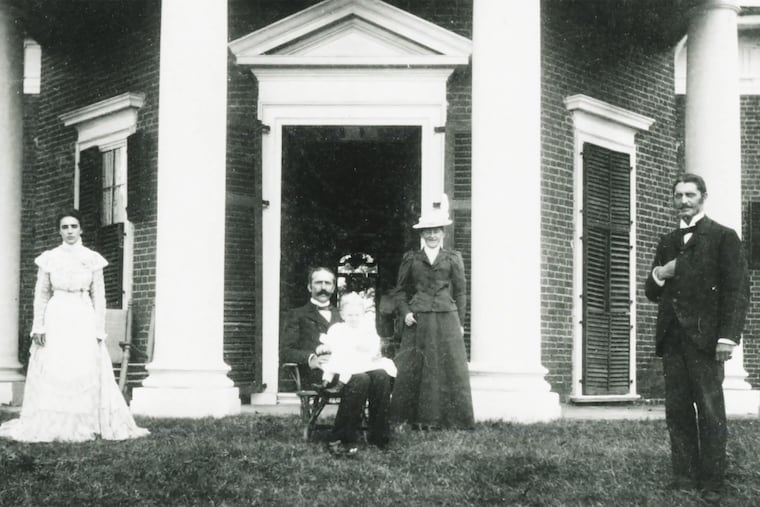Jewish Film Festival documentary explores the Philly family who owned Monticello after Thomas Jefferson
2022 marks the 42nd edition of the festival that runs Nov. 12-17

A Philadelphia Jewish family once owned and restored Monticello, the Virginia plantation and home of Thomas Jefferson, for nearly 100 years in the 19th and early 20th centuries. Their ownership of the landmark is the subject of a documentary at the 42nd Philadelphia Jewish Film Festival, Nov. 12-17.
The Levys of Monticello, directed by journalist-turned-documentarian Steven Pressman, screens Sunday, Nov. 13, and Monday, Nov. 14. Pressman previously made 50 Children: The Rescue Mission of Mr. & Mrs. Kraus, a documentary about a Jewish couple from Philadelphia who saved children during the Holocaust.
After Jefferson’s death in 1826, his Monticello estate in Charlottesville, Va., was purchased in 1834 by Uriah Levy, a Philadelphia native and commodore in the Navy. (A statue of Levy stands at Philly’s Congregation Mikveh Israel in Old City.) Levy faced antisemitism during his time in the Navy, once punching someone in the face after he was abused, and was a strong advocate of religious freedom.
Levy was inspired by his stewardship of Monticello, in part, because he was a great admirer of Jefferson. While advocating stridently for freedom in some aspects, Levy, like Jefferson, enslaved people. The exploration of this dynamic is a key part of the documentary — a bigger part, Pressman said, — than he expected when he started.
“I have to admit that my own thinking as a filmmaker evolved as I was making the film,” he said.
“As I got more and more immersed in the project, I realized that you cannot tell a story about Monticello without addressing, in a very significant way, the story of slavery. It’s woven into the fabric of Monticello, both during Thomas Jefferson’s time, of course, but as I learned, also during the years that Uriah Levy owned Monticello. When I learned that [Levy] enslaved people (and acquired more during his years of owning Monticello), I realized I had an obligation to emphasize that part of the story.”
There are records of at least 20 formerly enslaved people running away from Monticello between 1769-1819. Jefferson freed only seven people — two while alive, five in his will.
Levy, a Union loyalist, died in 1862, leaving Monticello to the American people in his will. The estate was seized by the Confederate government during the Civil War.
“I always knew, when I was making the film, that it had this modern-day relevance,” Pressman said. “In that telling the story of the Levy family, and their ownership and preservation of Monticello, and what they went through, it was a way to shine a broader light on antisemitism, both as it existed in their day, but as it continues today.” The deadly white supremacist “Unite the Right” rally in 2017 took place just four miles from Monticello.
Following two lawsuits and an ugly campaign to remove the Jewish family’s stewardship of the estate, Jefferson Monroe Levy, Uriah Levy’s nephew, took control of the estate in 1879 and restored it. In 1923, he sold it to the Thomas Jefferson Memorial Foundation, which runs it as a historic site and tourist attraction.
This year’s Philadelphia Jewish Film Festival opens Nov. 12 with Moshe Rosenthal’s Karaoke, an Israeli film about a long-married couple whose lives are turned upside down by the arrival of a stranger, and closes Nov. 19 with America, The Cakemaker, director Ofir Raul Graizer’s melodrama about an Israeli swimming coach returning home after the death of his father. Other highlights include a brunch-and-film program dedicated to the 1968 Barbra Streisand movie Funny Girl, and Sandrine Kiberlain’s A Radiant Girl, a French film about a Jewish aspiring actress in Nazi-occupied France. There is also a full shorts program.
“So many people think that a Jewish film festival is just Holocaust films and Israeli films, but that’s not the case,” said Matthew Bussy, program director for Philadelphia Jewish Film and Media, which puts on the festival. “Yes, we love showing those because they’re both very important, but we really want to show films that show a different side.”
The Philadelphia Jewish Film Festival, which has undergone both name and location changes in recent years, is back to a full in-person festival this year, after going online-only in 2020 and hybrid last year. The Weitzman National Museum of Jewish History will host the opening and closing nights; other programming is set for the Kaiserman JCC, Gratz College, the Ambler Theater, and the Arden Theatre.
The 42nd Philadelphia Jewish Film Festival runs Nov. 12-17. For details on schedule, tickets, and venues, visit: phillyjfm.org/.